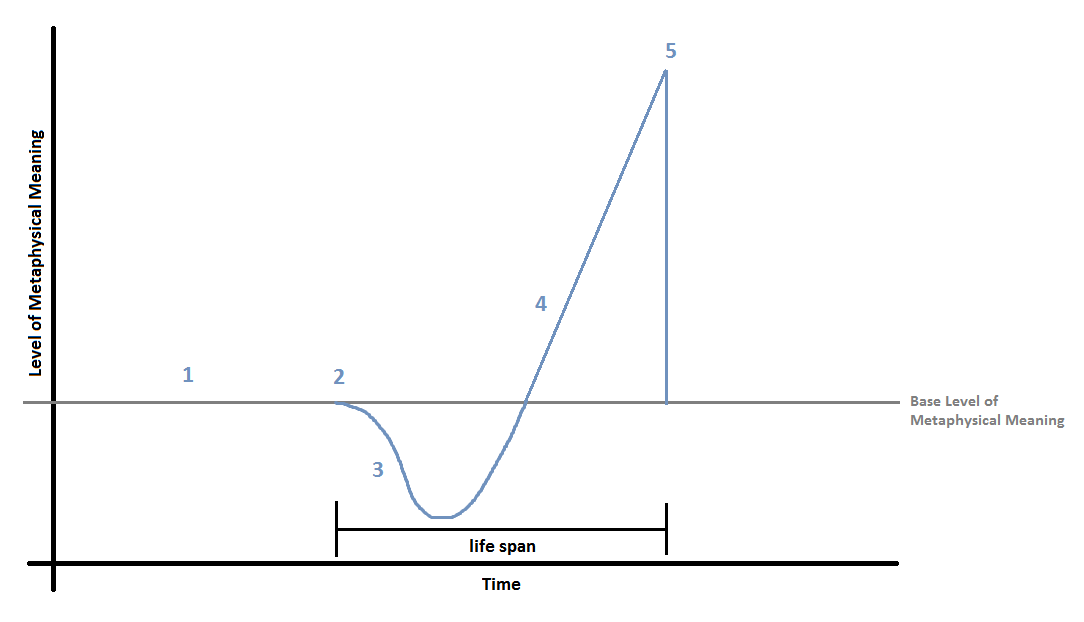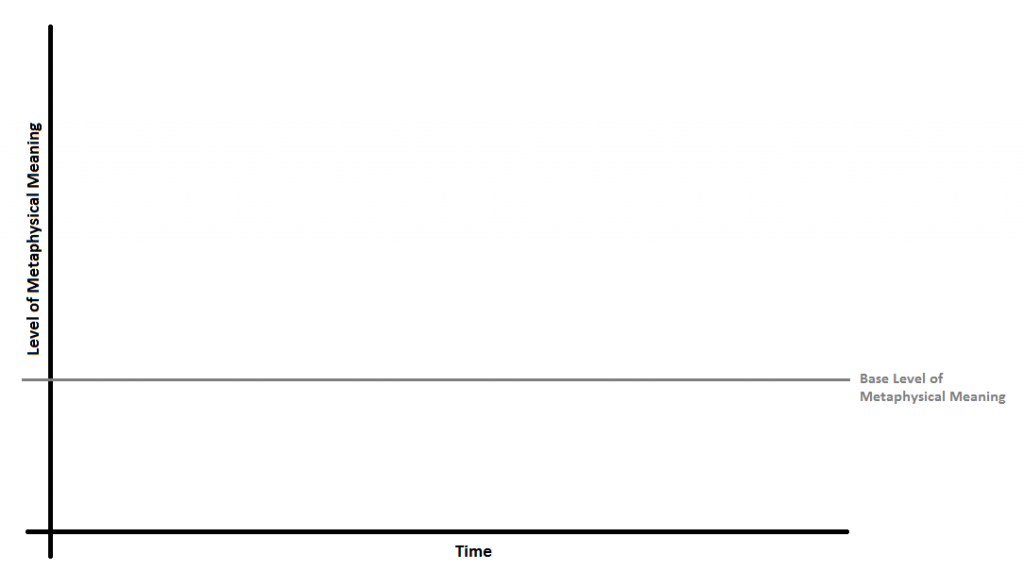Transliminism Part II
In the philosophy of Transliminism, humans possess the potential to differentiate life from death by reaching a metaphysical realm. The stakes of achieving this differentiation are enormous, for it lends meaning to our existence. Otherwise, humans would essentially be amoebas, organisms whose existence are purely physical, an existence able to be boiled down to simple science.
In this post I shall elaborate on the journey to reaching a metaphysical realm. Keep in mind for this post, as well as all posts on this blog, that I am merely speculating based on my limited experiences and time alive. Take this for what you wish.

1. Nonexistence
At this stage, the individual has not yet been born. Since he does not exist, his metaphysical level of function remains at the neutral level, or the “amoeba line.”

2. Birth
The individual is born. Now possessing a consciousness, he is able to function metaphysically to some degree.
3. Awareness and Descent
It is my belief that before anyone can discover meaning, they must first be disillusioned the the vacuum of meaning present in society and the monotony of everyday life. This relates to the existentialist belief that life is inherently meaningless. The universe was not created to answer the struggles of man. Therefore, embarking on the journey for meaning poses a risk, that of relinquishing blissful ignorance and having the truth of a meaningless environment thrust upon oneself. The complacent ease of an amoeban lifestyle cannot be repossessed by natural choice. Like the concept of innocence, ignorance, when lost, is lost forever.
The journey for meaning is a gamble, risking one’s comfortable physical existence in hopes of achieving an infinitely more meaningful metaphysical existence. However, this gamble is more often imposed on individuals rather than chosen by self volition. Having experienced tragedy myself, I would say that this journey was imposed on me. I will elaborate on a later post, but I believe tragedy changes human perspective by suddenly shattering the idealistic notion of the just universe, governed by laws of principle and good. It’s as if the fairytale took an abrupt, twisted ending devoid of happiness. At this point of awareness, the individual undergoes a descent in metaphysical meaning, below the amoeba line. He feels despair and hopelessness, wondering how he should exist in such a universe so indisposed and apathetic to the individual’s sufferings. Perhaps this feeling is so strong that it even overpowers the empathy of a loving community. Although he may be more in touch with the metaphysical realm, it’s a negative experience that is fueled by misery. It is during this descent, that I believe many people sadly choose to end their lives rather than to continue existing. By ending their lives, they can escape the negative meaning and return to the neutral amoeba line of nonexistence.
4. Transcendence

Some individuals take the more fortunate alternative, which is to not only endure the tragedy but to learn from it. Perhaps, by sparking their consciousness, tragedy has granted the individual a glimpse at his true identity and his relationship to the world around him. Perhaps he sensed a light at the end of the tunnel somewhere amidst the misery. He comes to accept the existentialist nature of the universe and faces the challenge of discovering and pursuing meaning as dictated by himself. He realizes that being in this ditch of meaning also generates the possibility of achieving an existence more meaningful than before, more meaningful than death and amoeban ignorance.
Before one experiences an increase of meaning, they must discover what is meaningful to themselves. The prerequisite to this is discovering one’s identity, which can be facilitated by exposure to a variety of human experiences and emotions. This may include traveling the four corners, or educating oneself through reading literature.
5. Death
In the pursuit of this subjective activity, this vessel of meaning, one’s life transcends the inherent meaninglessness of death. This is transliminism, the rise above the threshold. Not only does one perceive the difference between life and death, one possesses the knowledge to pick the fruit of human life. Human life presents the opportunity to attain meaning, and it is this very elevated level of metaphysical existence makes life worth living despite its transience.
The human is perhaps the only species aware of its own mortality. The notion of death has permeated nearly every facet of human civilization, from the success of religion to the idea of childhood education. For me, I see value in death because it drives humans to seek a metaphysical realm. It drives our race in seeking, perhaps a little too superstitiously, a way to differentiate between life and death rather than simply accepting that life is a series of chemical reactions, and death is the end of those reactions.
My intuition tells me that humans are not amoebas. Perhaps science is against this, but it is my hope that as our knowledge of the human brain grows deeper, that the argument will shift in favor of metaphysical meaning. Until then, I shall embrace my imagination as one of many dreamers.
